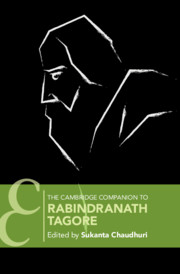Book contents
- Frontmatter
- Contents
- List of Illustrations
- Notes on Contributors
- Preface
- Note on Conventions and Practices
- 1 Rabindranath Tagore: From Art to Life
- 2 A Garland of Many Tagores
- Part I Overviews
- Part II Studies
- 12 Women, Gender, and the Family in Tagore
- 13 On the Seashore of Endless Worlds: Rabindranath and the Child
- 14 Tagore's View of History
- 15 Tagore's View of Politics and the Contemporary World
- 16 Tagore's Santiniketan: Learning Associated with Life
- 17 Tagore and Village Economy: A Vision of Wholeness
- 18 An Ecology of the Spirit: Rabindranath's Experience of Nature
- 19 Rabindranath and Science
- 20 Rabindranath Tagore as Literary Critic
- 21 Tagore's Aesthetics
- 22 Rabindranath, Bhakti, and the Bhakti Poets
- 23 Tagore and the Idea of Emancipation
- 24 Tagore's Thoughts on Religion
- 25 Rabindranath Tagore and Humanism
- List of Tagore's Works Cited, with Index
- Further Reading
- General Index
18 - An Ecology of the Spirit: Rabindranath's Experience of Nature
from Part II - Studies
Published online by Cambridge University Press: 24 December 2019
- Frontmatter
- Contents
- List of Illustrations
- Notes on Contributors
- Preface
- Note on Conventions and Practices
- 1 Rabindranath Tagore: From Art to Life
- 2 A Garland of Many Tagores
- Part I Overviews
- Part II Studies
- 12 Women, Gender, and the Family in Tagore
- 13 On the Seashore of Endless Worlds: Rabindranath and the Child
- 14 Tagore's View of History
- 15 Tagore's View of Politics and the Contemporary World
- 16 Tagore's Santiniketan: Learning Associated with Life
- 17 Tagore and Village Economy: A Vision of Wholeness
- 18 An Ecology of the Spirit: Rabindranath's Experience of Nature
- 19 Rabindranath and Science
- 20 Rabindranath Tagore as Literary Critic
- 21 Tagore's Aesthetics
- 22 Rabindranath, Bhakti, and the Bhakti Poets
- 23 Tagore and the Idea of Emancipation
- 24 Tagore's Thoughts on Religion
- 25 Rabindranath Tagore and Humanism
- List of Tagore's Works Cited, with Index
- Further Reading
- General Index
Summary
It is the tears of the earth that keep her smiles in bloom.
The fallen petals that Rabindranāth gathers in the flower basket of Stray Birds are imbued with poignant insights into the nature of existence. Some of these aphorisms were composed during the First World War – ‘the war to end all wars’ – when a self-destructively ambitious, globally avaricious Europe was savaging itself over the division of the spoils of colonial conquest. The spectacle of violent nationalistic greed – a forerunner of today's warring world – prompted Tagore to write: ‘I thank thee that I am none of the wheels of power but I am one with the living creatures that are crushed by it.’ This expression of gratitude, which is equally a declaration of loyalties, is preceded by another valiantly humble line: ‘The stars are not afraid to appear like fireflies.’
Rabindranath is not an environmentalist as sometimes claimed. Some of his work – prominently the plays Muktadhāra and Raktakarabi – takes up, almost prophetically, environmental issues of great relevance in our own time, like giant dams and mining. But his fundamental commitment is to nothing less than the elusive simplicity of everyday sentience, ecological living and dying – something rendered remote, or even impossible, by the technocratic colonization of the planet in the twenty-first century. His poetry delivers what only poetry can: a mode of apprehension beyond scientific cognition, expressing what we are as against what we merely think about. It takes a poet to remind us of our myriad ecological responsibilities as speaking beings.
ECOLOGY AND COSMOLOGY, LIFE AND DEATH
Rabindranath's ecological vision is impossible to grasp unless one recognizes the cosmology in which it lives. He experiences life in wholes larger than his mortal self, feeling and thinking holistically in the most generous and expansive sense of even that inclusive term. This enables him to understand human life and death, as well as our place in nature and the broader scheme of things, in an ecological key. In varied genres of creativity, he demonstrates what it means not just to think but to live and die ecologically, never forgetting the power of nature within and around us.
- Type
- Chapter
- Information
- The Cambridge Companion to Rabindranath Tagore , pp. 323 - 336Publisher: Cambridge University PressPrint publication year: 2020



